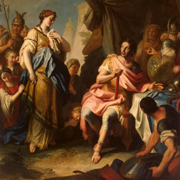Gluck’s ballet Les Amours d’Alexandre et de Roxane is published in the Complete Edition.
With his dance dramas created at the beginning of the 1760s, Gluck, in collaboration with the choreographer Gasparo Angiolini, helped give the genre a new form: as a rejection of the schematised form of courtly Baroque dance interludes, a new kind of independent, dramatic action ballet (Ballet en action) was created which conveyed both action as well as emotion through movement, gesture and semantically-charged music. Alongside the original version of Don Juan reconstructed by Sibylle Dahms, Gluck’s ballet Les Amours d’Alexandre et de Roxane, premiered in the Vienna Burgtheater in 1764, has now been published as part of the Gluck Complete Edition in an edition by Irene Brandenburg. Its subject is drawn from the story of Alexander the Great – the love of the Macedonian king for Roxane, the daughter of the Bactrian prince. In terms of form, the dance drama, comprising nine numbers and an introductory sinfonia, is a mixture between pantomimic action ballet and divertissement. This open structure, probably resulting from different performance conditions, is also reflected in the surviving copies: of the three sets of parts created for and around the time of the Viennese premiere, two contain the work in its full instrumental scoring – that is, with additional trumpets and timpani – whilst a third set of parts preserved at Ceský Krumlov (formerly Krummau) provides only for strings, oboes, bassoon and horns, and depicts the musical heart of the ballet by foregoing repetitions of movements.
There is no surviving scenario from the premiere of Les Amours d’Alexandre et de Roxane and therefore no definite proof of Angiolini’s involvement as choreographer; neither are there any annotated music sources which might contain hints about choreographic or dramatic action, unlike with Don Juan. There is only a scenario by Angiolini from 1780 for a ballet on the subject of Alexander, which was performed in Verona as an interlude to Antonio Salieri’s dramma giocoso La Scuola de’ gelosi. Even if Gluck is not listed in the scenario by name as the ballet composer, the outline plot can very plausibly be linked to his music. To support modern stage practice, this allocation of the scenario to the musical sequence is given in the new edition, as is the original wording and a German translation of the scenario, so that the text can serve as an explanation of the plot in concert performances or as a possible basis for a choreographic interpretation.
Tanja Gölz
(from [t]akte 2/2012)



